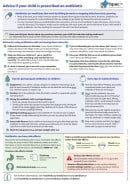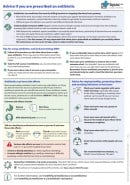Doxycycline
Sounds like 'dox-i-sye-kleen'
Key points about doxycycline
- Doxycycline is an antibiotic used to treat different infections caused by bacteria.
- Doxycycline is also called Doxine.
- Find out how to take it safely and possible side effects.

Doxycycline is an antibiotic used to treat bacterial infections, eg, chest, sinus and pelvic infections. It may be chosen if you are allergic to penicillin. It is also used to treat skin conditions such as acne and for malaria prevention(external link) when travelling to some countries.
Doxycycline belongs to a group of antibiotics called tetracyclines. Like all antibiotics, doxycycline isn't effective against infections caused by viruses.
In Aotearoa New Zealand, doxycycline is available as tablets (100 mg).
- The dose of doxycycline will be different for different people depending on the type of infection.
- The usual dose of doxycycline is 100 mg once or twice a day.
- Your doctor will advise you about how long to take doxycycline for.
- Always take your doxycycline exactly as your doctor has told you. The pharmacy label on your medicine will tell you how much to take, how often to take it, and any special instructions.
- Note: Doxycycline is not usually given to children because it can affect growing teeth and bones.
- Swallow your doxycycline tablets with a large glass of water.
- Take doxycycline with food and a large glass of water to wash them down. Doxycycline can cause severe indigestion and problems with your throat and oesophagus if the tablets are not swallowed properly.
- Remain upright for at least 30 minutes after taking doxycycline. Don't lie down for at least 30 minutes after taking doxycycline and don't take it just before bed.
- Swallow the tablets whole – don't crush or chew them.
- Don't take your medicine together with dairy products. This is because dairy foods like milk, cheese and yoghurt can stop your body from absorbing doxycycline. You can have dairy products a few hours before or after your dose.
- Missed dose: If you forget to take your dose, take it as soon as you remember. But if it is nearly time for your next dose, just take it at the right time don't take double the dose.
Here are some things to know when you're taking doxycycline. Other things may be important as well, so ask your healthcare provider what you should know about.
- If you are taking the contraceptive pill, you don't usually need to use additional contraception if you're taking doxycycline. But if the antibiotic or the illness they're treating cause diarrhoea or vomiting lasting more than 24 hours, absorption of the contraceptive pill may be affected. If this happens, ask your doctor or pharmacist for advice about contraception over the following few days.
- Taking some medicines (eg, antacids and iron preparations) at the same time as doxycycline can reduce how well it fights infection. Don't take indigestion remedies, iron or calcium preparations within 2 hours of taking doxycycline.
- Doxycycline can make your skin more sensitive to the sun. This can cause a burning, tingling feeling on your skin when you are in the sun, or you may notice redness. When outside, protect your skin and eyes by using a good sunscreen (at least SPF30+) and wearing sunglasses, a sunhat and clothing that protects you from the sun.
- If you are pregnant, think you might be pregnant or you're breastfeeding, let your doctor know before taking doxycycline.
Like all medicines, doxycycline can cause side effects, although not everyone gets them. Often side effects improve as your body gets used to the new medicine.
| Side effects | What should I do? |
|---|---|
|
|
|
|
|
|
|
|
|
|
|
|
| Read more about medicines and side effects and reporting a reaction you think might be a side effect. | |
The following links provide further information on doxycycline:
Medsafe Consumer Information Sheet: Doxine(external link)
New Zealand Formulary Patient Information: Doxycycline(external link)
References
- Doxycycline(external link) New Zealand Formulary
- Antibiotics: choices for common infections(external link) BPAC, 2017
Brochures

Advice if your child is prescribed an antibiotic
BPAC, NZ, 2024

Medicines and side effects
Healthify He Puna Waiora, NZ, 2024
Credits: Sandra Ponen, Pharmacist, Healthify He Puna Waiora. Healthify is brought to you by Health Navigator Charitable Trust.
Reviewed by: Angela Lambie, Pharmacist, Auckland
Last reviewed:
Page last updated:






